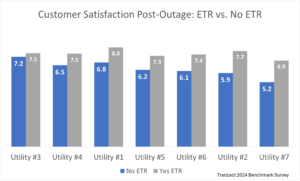ETRs Drive 30% Satisfaction Boost for Low-Scoring Utilities
Customer satisfaction surveys have been a key tool in utilities’ efforts to measure and improve the experiences of customers. With advancements in information technology, utilities can now move beyond broadly distributed, periodic surveys to targeted surveys sent to customers making detailed and real time feedback possible.
The outage experience is a critical customer experience and a great test case to illustrate the unique benefits of post-event surveys. By capturing customer satisfaction alongside their specific experiences, we can accurately define how particular experiences influence overall satisfaction. By waiting for the next annual or quarterly survey round, these details get lost.
Using example data from Chartwell’s Tranzact study (actual data that has been anonymized) we can show how receiving an Estimate Time of Restoration (ETR) improves customer satisfaction at all utilities. Crucially, customers at utilities with lower baseline satisfaction scores are even more appreciative of ETRs and show improvements of 30% or more.

Utilities also need to be aware that just because they are calculating ETRs and making them available to customers, that doesn’t mean that they are actually making their way into the hands of customers. Many utilities, especially those with shorter outages, struggle to effectively communicate ETRs through channels like outage maps. As illustrated below, some utilities manage to reach only half of their outage map users with ETRs. Utilizing outbound alerts such as text messages, emails, and mobile app notifications ensures that ETRs are delivered to customers as soon as they are ready.

If utilities wait too long to capture customer feedback, or don’t ask about specific experiences, they miss out on crucial insights. Post-event surveys are an effective tool for capturing detailed customer experiences, enabling utilities to develop informed strategies to enhance service delivery.
CURI Research Center subscribers can read the full report here. To learn more, please contact Tim Herrick.





